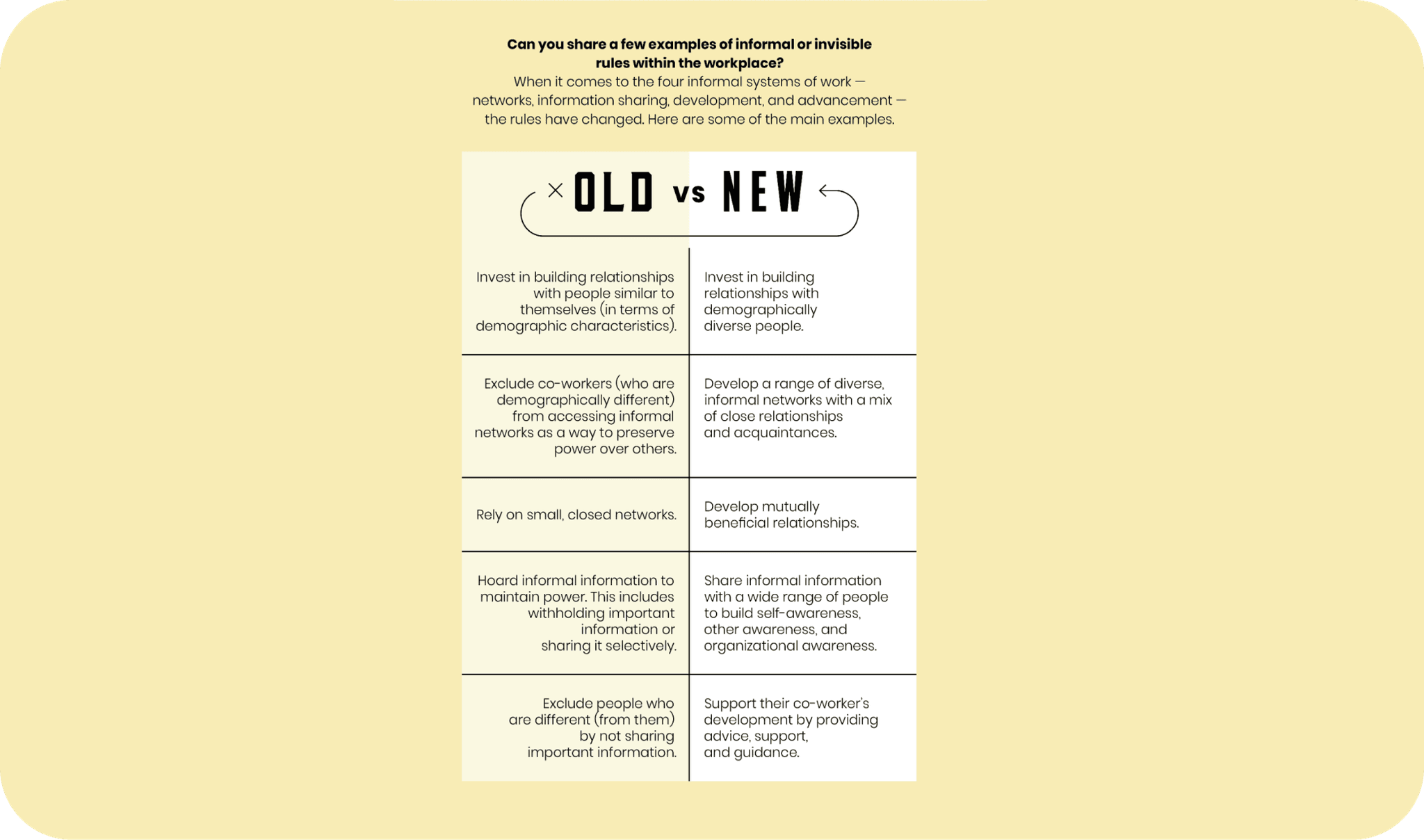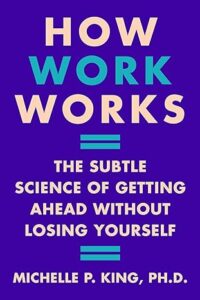
Interview: Dr. Michelle P. King
The new rules of work


Michelle King has brought together 20 years of research into corporate culture in a new book, ‘How Work Works: The Subtle Science of Getting Ahead Without Losing Yourself.’ Speaking with ai:sight, she tells us why, when it comes to working life, what you see is not always what you get.
The old playbook that helped your boss rise to the top is exactly what is holding you back, according to organizational culture expert Michelle King. New rules govern today’s workplace – informal, unspoken, and often invisible rules that we must all learn to recognize, decipher, and implement to get ahead.Michelle King has brought together 20 years of research into corporate culture in a new book, ‘How Work Works: The Subtle Science of Getting Ahead Without Losing Yourself.’ Speaking with ai:sight, she tells us why, when it comes to working life, what you see is not always what you get.
What do you believe most commonly holds people back from progressing in their careers?
For me, it’s navigating the formal side of working life. We know that workplaces have changed. In the past, we’d go to work, sit at a desk, do our tasks, and then go home. The best way to lead and succeed in that environment was to be quite transactional – it was a case of command and control your employees in a dominant, aggressive, and maybe even a little bit exclusionary way. That approach doesn’t work today. Most of us must work with other people to achieve outcomes: about 82% of jobs require some form of collaboration. Many leaders have yet to catch on to this, but now our ability to succeed requires knowing how to work with people who maybe don’t share our background – and that requires social skills.
Our research has found that 75% of career success depends on advanced social and emotional skills, and only 25% depends on technical know-how. That’s because you can learn those hard skills, but acquiring the social and emotional skills requires more effort. That’s why I wrote the book.
Please give us some examples of ‘the new rules of work’. How do these rules impact the way we work together?
First, I want to explain the new world of work. Of course, new technologies such as AI and automation are changing jobs. But there’s also the rise of demographic diversity as we work in an increasingly global field. These changes impact the nature of our work environment. We’re seeing organizational structures that are flatter – where companies are shifting towards self-managing teams. This type of social work environment requires a new way of working.
In the book, I offer four areas that we can look to improve.
The first is building informal networks. In the past, we’ve gotten away with only really networking with people that look like us. It’s the basis of the old boys’ club. Today, that’s one of the worst things you could do. That’s because, by 2044, half of all Americans will be part of an underrepresented group in an organization. And studies have now found that the top 20% of individuals have a diverse network. So, building and navigating an informal network will serve you when it comes to employability.
The second area that I mention in the book is informal information sharing. People who give you access to information help build your self-awareness and awareness of others. And that’s super important when it comes to managing our interactions.
The third area is around how we navigate our informal development. 70% of all learning happens on the job, so we’ve got to learn and upskill continually.
The final piece is that there is no one career ladder. You don’t just advance from job to job. So how do you actively manage your career? And how do you manage your advancement? And, importantly, how do you find meaning in what you do? So, those are the four areas that I cover in the book. Each has a set of rules, findings and recommendations about what you can do to manage those areas more successfully.
What benefits might we realize by successfully navigating these new rules of work?
I think the greatest benefit is in the book’s final chapter: achieving meaning and fulfillment at work.
The reality is that nine out of 10 of us would trade a significant portion of our income for greater meaning at work. But how can we develop that? Well, there’s one practice that I can share that makes a big difference to your sense of meaning at work: the notion of paying it forward. It’s about taking the time to support your peers. For me, that doesn’t just mean random acts of kindness. It means actively supporting them by sharing information, helping their development, and advocating their advancement.
The best thing about this is that if you go out of your way to connect with me, for example, and somebody else observes you making the effort to get to know me, not only will you feel good for having done that, but I’m going to respond positively, and the people around me are going to respond positively too. As a result, everyone around you will want to pay it forward – and that’s why it’s such a powerful practice.
Can you explain what you mean by ‘reading the air’ and its importance in the workplace?
In the book, I share the true story of a Japanese businessman who met a potential client. After a while, the client commented on how he liked the businessman’s watch. At first, the man just looked at his watch and continued with what he was saying. But then he realized the client wanted him to look at his watch, see what time it was, and wrap up the meeting.
The Japanese have a term for understanding the how of work or reading the shared norms of social situations, “Kuuki o yomu,” which translates to “read the air.
Likewise, every country has different versions of this, where we talk and say things in a way between the lines. We don’t say what we mean because it might come across as aggressive, or we might embarrass someone. It’s called different things in different cultures – sometimes ‘reading the room,’ sometimes ‘reading the air,’ but it’s an important skill to have, especially when it comes to navigating the changes in the workplace.

Can you give us a sneak preview of one of your actionable tips that might help our readers do better at work?
I will start with a tip about self-awareness, which is the gap between how you see yourself and how others see you regarding your thoughts, behaviors, and feelings. The challenge here is that there’s a major self-awareness gap.
90% of people lack self-awareness. The problem is that most people think they’re self-aware when they’re not. The higher up an organization you go, the more the problem is demonstrated.
We call it the CEO disease because leaders typically do not have access to honest feedback, so they can’t close the gap. But self-awareness is important.
There are two ways you can lack self-awareness. You can either consistently overestimate how awesome you are or you underestimate it. If you tend to overestimate, you will likely be quite difficult to work with. Having someone like this on your team can reduce your team’s performance by 50%. That’s because they are not open to feedback.
So, how do we close the gap? One study found that if you don’t have access to direct and honest feedback, you can increase your self-awareness by as much as 23% by simply taking 15 minutes a day for 10 days to consider the following three questions: What worked well today? What didn’t go so well today? And what could I do differently? You want to avoid asking ‘why?’ because that’s not helpful. For anyone else, it’s important to seek out regular feedback. That feedback is data and information on your gap. If you disagree with the feedback, lean into it to help you close the gap even further.
What do you mean by informal networking, and how is it as important as formal networking?
In my extensive research, a compelling revelation has emerged: within professional teamwork, forming informal networks or social groups is pivotal in fostering effective collaboration. These informal networks encompass the myriad relationships individuals cultivate and nurture within the workplace, yet these connections do not adhere to the rigid structures dictated by organizational hierarchies. They transcend the formal affiliations we maintain with our superiors, colleagues within our team, or even associates beyond the immediate workspace.
The lifeblood of any organization, these informal networks encompass all the spontaneous connections – think of employee-to-anyone relationships – that evolve within the workplace environment. Such relationships are not restricted by the predefined channels of the corporate hierarchy, such as the employee-manager dynamics. Rather, informal networks encompass the individuals you regularly engage or socialize with, recognizing that these connections hold mutual benefits.
Consider, for instance, scenarios where you seek support for a project, seek consensus on pivotal decisions, require introductions to influential figures, or yearn for support in advancing your career. In such instances, comprehending the functioning of these informal networks becomes paramount, as does the ability to manage them. It is essential to grasp that without access to these informal networks, attaining the necessary information, guidance, and support for career progression becomes exceedingly arduous.
Contrary to popular belief, establishing an informal network is not a product of mere attendance at formal events, nor does it hinge on exchanging business cards during a casual cocktail hour. No matter how many formal networking or leadership development gatherings one may attend, individuals will only invest in cultivating relationships with those they trust implicitly. Trust emerges as the linchpin upon which the foundation of these invaluable informal networks is built.
How Work Works: The Subtle Science of Getting Ahead Without Losing Yourself
A unique and revelatory guide to understanding and navigating the unwritten rules of the workplace—the key to achieving success, finding meaning, and staying true to your authentic self in today’s business world
In-person

Ram co-founded Final Mile in 2007, working in large and small organizations across marketing, M&A, branding, and business management. Since 2011, he has built Final Mile’s development sector practice, bringing together a strong and diverse team of behavioral science and design experts. In 2018 Final Mile became a Fractal company. Ram is a regular speaker at conferences on public health and behavior change.





